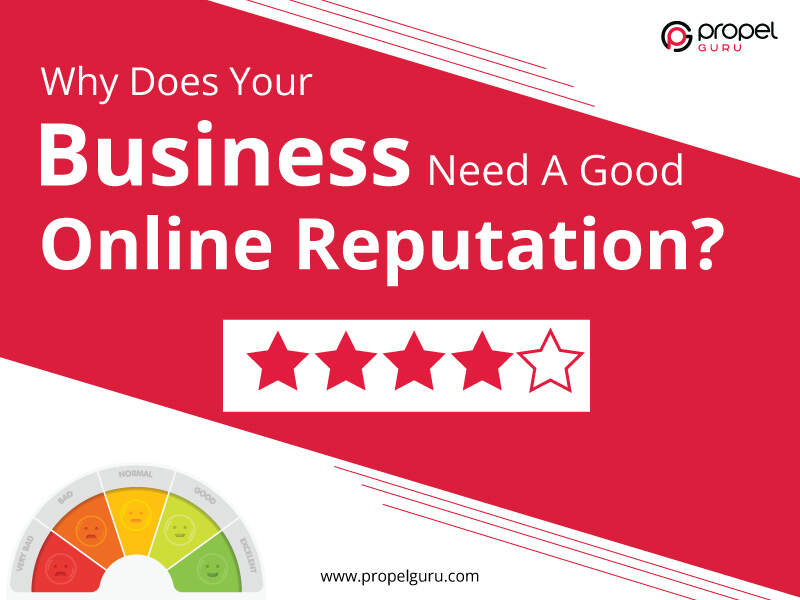Sharing is caring!
Owning your company’s online reputation in a competitive industry can be difficult and time-consuming. With social media sites like Facebook, Glassdoor, Twitter, Indeed, Google, Clutch, Yelp, and a slew of others, it’s easy for a few disgruntled customers (or motivated competitors) to smear your brand with a few well-placed, well-worded negative reviews.
It’s becoming increasingly rare for any of us to do something without first Googling it—and this applies to our professional endeavors.
According to a report, 42% of adults in the United States check people up on search engines before conducting business. Furthermore, 45 percent of this group claims to have discovered something that prevents them from conducting business with that person. In addition, according to a survey conducted by BIA Kelsey, 97 percent of people check reviews about local companies before engaging with them.
So, how can you keep the online reputation of your brand safe?
Brand Reputation Management Plan
Let’s look at a sample reputation management plan that you can customize to match your company’s needs. It’s vital to remember that reputation management is a never-ending process. Thus neither phase should be skipped as long as your company is open for business.
- Research: Research is the first stage in reputation management. During this phase, you will use the internet to discover what people are saying about your company and how they’re talking about it. Make an effort to engage in various conversations, as all comments can help you better grasp people’s perspectives and improve your reputation.
This audit can be conducted using customer reviews, review sites, social media, and simply searching for your company’s name on Google and other search engines. You can also look for terms related to your industry or rival feeds. Consumers are already talking; all you have to do is meet them where they are.
- Establish a personalized management strategy: You qill know where to focus your efforts to improve your brand’s general perception once you know what it is. Let’s say your audit reveals that the discourse surrounding your brand is negative. In that situation, you will want to implement methods that will assist you in improving your customers’ experiences with your company.
As a result, the following stage is to develop a consistent management strategy. Whatever your current situation is, your plans should include the following:
- Who will keep an eye on internet interactions regularly?
Determine who in your company will be in charge of conducting ongoing research and monitoring internet talks about your company.
- A guide to using when responding to comments
If you don’t have a consistency in your tone of voice, responding to comments and conversations about your business is pointless. For instance, if you reply brutally to criticism while reacting positively to positive comments, you will cause more harm than good.
- What criteria do you use to determine which comments, reviews, or mentions require a response?
Some folks are merely looking to troll rather than share genuine experiences. These bogus comments and chats were made to sully your reputation. On the other hand, the majority of comments are based on actual interactions, experiences, and opinions about your brand, both favorable and bad.
- Unknown Website Listings: There are numerous internet directories and the ones that come to mind are Yelp and Trip Advisor. Some of this could be completely harmless.
Perhaps your SEO team entered your company into a directory to aid in creating backlinks. This is acceptable as long as the directory has a decent reputation. It is best that you or your agency keep watch of directories that ‘go rogue’ and have negative influence on your site as it connects back to you. In Google’s Search Console platform, these may need to be disputed.
It’s also worth looking for firms with the same or similar names that have been listed. As soon as feasible, claim your business name on as many well-known business directories as possible.
- People Trust People: Online reviews have a lot of influence. It’s apparent that, just as in real life, people place their trust in social media platforms and Google.
People hardly do any fact-checking these days. Simply placing five golden stars on your website can convert a casual visitor into a client. Whereas, a negative review can be highly damaging to your organization. Client logos, testimonials, and direct links to other review platforms from your site could help develop trust.
Final Thoughts
Listening to what your consumers say and finding methods to engage with them are the first steps in managing your online reputation. While responding to online criticism and developing an SEO strategy is important, they may not be enough to shield your business against smear campaigns. In such instances, it may be necessary to seek expert assistance.
Remember the words of Warren Buffet –
“It takes 20 years to build a reputation and five minutes to ruin it. If you think about that, you’ll do things differently.”



Ausaf Ahmed
Senior Project Delivery Manager
A passionate and enthusiastic senior digital marketing and sales specialist who is highly proficient in planning, implementing, managing the entire business-to-business sales and marketing process for selling the company’s advertising products and services. Having rich expertise and in-depth domain knowledge in the field of both sales and digital marketing, he ensures that he has a confident and winning attitude even during challenging business interactions.



